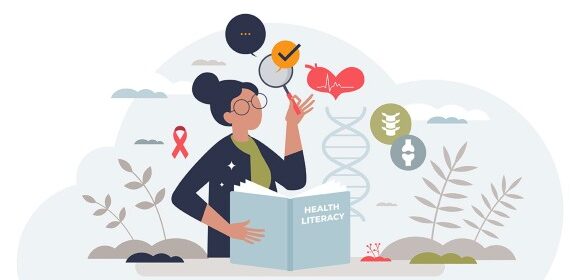The Power of Knowledge: Health Literacy and Informed Healthcare Decisions

ELIZABETH VAITL – In an age where healthcare grows increasingly complex and new medical developments arise continuously, the ability to understand and utilize health-related information is more critical than ever. Personal health literacy, or the capacity to comprehend and apply medical information, is a cornerstone of personal health empowerment.
Health literacy is not just about being able to read medical jargon or recall every step of a complex treatment; it encompasses a broader range of skills. It involves the ability to understand medical diagnoses and treatment options, evaluate the credibility of sources providing health information, communicate effectively with healthcare providers, and navigate the healthcare system, including insurance, appointments, and medical records.
The Consequences of Low Health Literacy
Low health literacy can lead to confusion, misunderstandings, and poor health outcomes. Patients who are unable to interpret health information have been shown to experience greater hospitalization and mortality rates, as well as develop more diseases than those with higher health literacy scores. Those with limited health literacy may struggle to follow treatment plans, leading to medication errors, missed appointments, and avoidable complications. This can result in higher healthcare costs, poorer health outcomes, and a reduced quality of life.
A Public Health Crisis
As of 2018, approximately 80 million adults living in the United States are estimated to have limited or low health literacy, this number likely increasing along with population. According to the North Carolina Institute of Medicine, low-income individuals, the elderly, and those with limited education or English proficiency are an especially vulnerable population of this critical situation.
Promoting Health Literacy
Supporting and increasing health literacy is a collective responsibility. Healthcare providers should use clear and plain language when communicating with patients, and ensure that patients have the opportunity to ask questions or seek clarification. In addition, educational institutions and community organizations can play a crucial role in improving health literacy by providing resources, workshops, and information.
Technology and Health Literacy
The digital age offers new opportunities to enhance health literacy. Online resources, mobile apps, and telehealth platforms can provide accessible, understandable health information. However, it is important to ensure that digital health resources are designed with user-friendly interfaces and plain language to be truly effective.
Health literacy empowers individuals by providing the tools they need to actively participate in their healthcare and make informed decisions about their well-being. When patients can understand their medical conditions, treatment options, and potential outcomes, they are better equipped to engage in meaningful conversations with healthcare providers, ask questions, voice concerns, advocate for their own health and rights within the healthcare system, and make conscious decisions about their care, including choosing treatment options that align with their values.
In essence, health literacy transforms patients from passive recipients of healthcare to active partners in their health and wellness. By equipping individuals with the knowledge and skills to understand and navigate the healthcare system, we can create a healthier, more informed population. It’s time to recognize health literacy as a fundamental component of a modern healthcare system that values and empowers every individual.
Copy Editor – Dione Geiling
Photography Source – https://www.nature.com/collections/eifgdfheih
